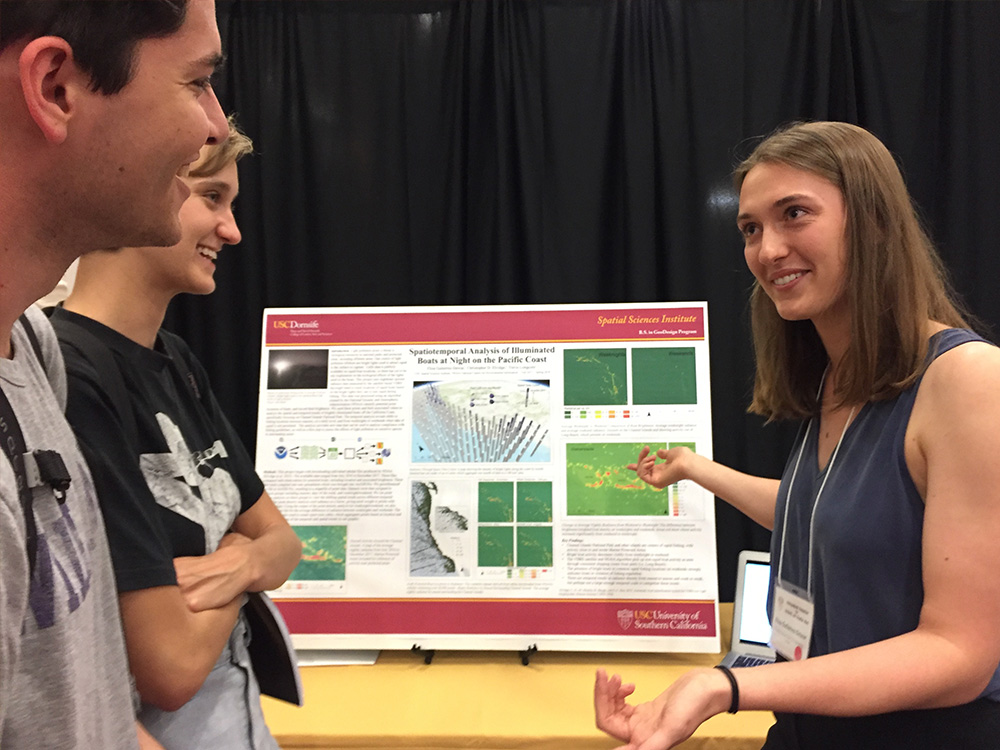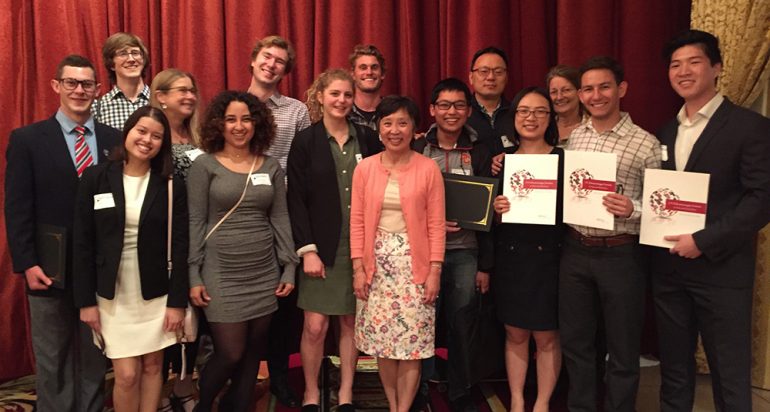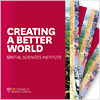Rocking the 2018 Undergraduate Research Symposium
USC Spatial students are recognized for their scholarship
At the April 11, 2018 Provost’s Undergraduate Symposium for Scholarly and Creative Work awards ceremony and banquet, three tables of enthusiastic attendees demonstrated wave after wave of spirit and pride as the evening program progressed. These spirited banquet attendees were USC Spatial students who, earlier that day in the Tutor Campus Center, had presented their posters to the USC community and for judging by faculty panels on their research with USC Spatial faculty funded by the Office of the Provost in the academic 2017-2018 year.
As Dr. Andrea Hodge, vice provost for undergraduate programs, congratulated all researchers and announced the winners at the symposium celebration held at Town and Gown, the USC Spatial students had reason to cheer, trade high-fives, and hug one another throughout the ceremony as they and their sponsoring faculty were recognized for their participation and accomplishments.
Recognized as USC Spatial students who presented in this year’s 20th annual symposium and their USC Spatial or other sponsoring faculty were:
- Benjamin Banet (B.A. in Interdisciplinary Studies): “A Photographic Light Pollution Assessment across Western Public Lands” (Dr. Travis Longcore);
- Austin Chow (B.S. in GeoDesign; Master of Planning), Haoshi Joanna Wang (B.S. in GeoDesign), and Richard Windisch (B.S. in GeoDesign; M.S. in Geographic Information Science and Technology): “Geospatial Applications for Residential Stormwater Capture for the City of Los Angeles” (Dr. John P. Wilson and Beau MacDonald);
- Grace Corsi (B.S. in GeoDesign; B.A. in Music), Julian Herren (B.S. in GeoDesign) and Christian Lance Relleve (B.A. in International Relations; Human Security and Geospatial Intelligence Minor): “Shade Structures of the Future: Innovative Skin Cancer Solutions” (Dr. Darren Ruddell and Dr. Jennifer Swift);
- Lisa Cortright (B.S. in GeoDesign) with co-authors: “Characterization of Spatial and Spectral Distribution of Outdoor Lighting at the Wrigley Marine Science Center” (Dr. Travis Longcore);
- Amanda Gilmore (B.S. in GeoDesign): “Spatial Modeling of Soil Organic Carbon in Depressional Landscapes of Minnesota” (Dr. An-Min Wu);
- Eliza Gutierrez-Dewar (B.S. in GeoDesign major; Architecture Minor): “Spatiotemporal Analysis of Illuminated Boats at Night” (Dr. Travis Longcore);
- Harrison Knapp (B.S. in GeoDesign; B.A. in Earth Sciences): “Classification System for National Park Sites Based on Nightscape Lighting Profiles (Dr. Travis Longcore);
- Samantha Levi (B.S. in GeoDesign) “Targeting the historical hydrology of Pimu (Catalina) Island and questions of scale” ( Dr. Su Jin Lee);
- Kevin Mercy (B.A. in Archaeology; Human Security and Geospatial Intelligence Minor): “Revelations from LiDAR: Maya Ground Reconnaissance (Dr. Steven Fleming);
- Kevin Mercy, Monica Finnstrom (B.S. in Environmental Science and Health; Spatial Studies Minor; M.S. in Geographic Information Science and Technology), Young-Kyung Kim (B.A. in International Relations; B.S. in Computational Linguistics; Spatial Studies Minor), and Lauren Mullarkey-Williams (B.S. in Policy, Planning and Development; Spatial Studies Minor; M.S. in Geographic Information Science and Technology): “Impact of municipal policies on trees in Los Angeles County” (Dr. Su Jin Lee); and
- Haoshi Joanne Wang (B.S. in GeoDesign): “Suburbanization and Spatial Inequality in Indian Housing Market” (Dr. Jefferey Sellers).

Eliza Gutierrez-Dewar presents at the April 11, 2018 Provost’s Undergraduate Symposium for Scholarly and Creative Work.
The applause was particularly loud for those from USC Spatial who won awards:
- The Social Sciences I category Interdisciplinary Award: Grace Corsi, Julian Herren, and Christian Lance Relleve;
- The Physical Sciences, Math, and Engineering Category Second Place Award: Eliza Gutierrez-Dewar;
- The Physical Sciences, Math, and Engineering Category Honorable Mention: Benjamin Banet;
- The Humanities Category Honorable Mention: Kevin Mercy, and
- The USC Schwarzenegger Institute for State and Global Policy First Place Award: Austin Chow, Haoshi Joanna Wang, and Richard Windisch.
In presenting the USC Schwarzenegger Institute prize, Conyers Davis, Director of Programs and Strategic Initiatives with the USC Schwarzenegger Institute, said, “The Schwarzenegger Institute is proud to select as our first place winning entry a project titled ‘Geospatial Applications for Residential Stormwater Capture for the City of Los Angeles,’ by Austin Chow, Joanna Wang and Richard Windisch.”
“Climate change is one of greatest challenges facing policy makers throughout the world and here is in Southern California drought is perhaps the most prevalent climate change concern facing civic leaders. There is not a silver bullet for dealing with drought and water scarcity in the region instead a multifaceted approach is needed.”
“The Schwarzenegger Institute has long believed that storm-water capture must be a key element of any comprehensive water policy and we were particularity impressed by the practical and cost effective solution that Austin, Joanna and Richard proposed in their project. By encouraging local communities to prioritize storm water capture at the local household level they can help Southern California save and utilize millions of gallons of water that normally would be lost.”
“As storms become more intense and less frequent, a by-product of climate change, the capture and storage of storm-water is becoming increasingly important. Austin, Joanna and Richard didn’t just research this issue, but they also created a tool that helps individuals and communities accelerate their water capture efforts. In doing so, we feel that they especially met the criteria for winning the Schwarzenegger Prize. We congratulate Austin, Joanna and Richard and everyone who took part in this year’s Undergraduate Research Symposium.”
For more information about the 2018-2019 USC Spatial URAP applications, visit the USC Spatial website at https://spatial.usc.edu/undergraduate/research-field-work/.





